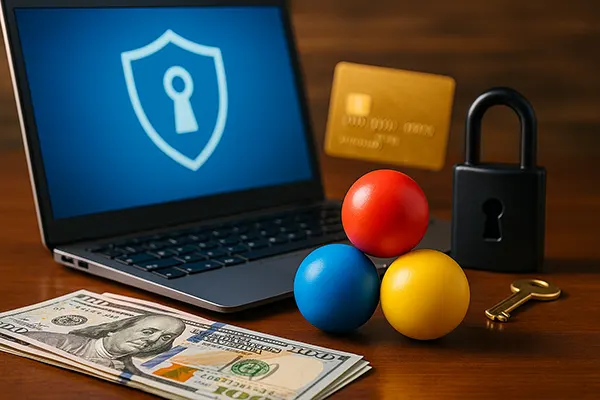With the growing popularity of online lotteries, the issue of cybersecurity has become more critical than ever. For many users, the digital environment offers comfort and ease, but it also poses significant risks if proper security measures are not taken. In this article, we delve into practical strategies to keep your lottery tickets and potential winnings safe from fraud, theft, or accidental loss. Everything presented is up-to-date as of February 2025 and aims to provide the most trustworthy, human-first guidance.
Main Cybersecurity Threats in Online Lotteries
The digital nature of lotteries exposes players to various cyber risks. Phishing attacks are one of the most common threats, where fraudsters create fake websites or emails to trick users into revealing sensitive data. These can resemble real lottery platforms and often target users with messages claiming they have won a prize.
Another frequent issue involves malware, especially trojans, that are secretly installed through unsafe websites or applications. Once inside a device, they can intercept passwords, access personal information, or directly manipulate accounts on lottery sites. Such software is often difficult to detect until it’s too late.
Lastly, weak passwords and lack of two-factor authentication remain significant vulnerabilities. Many users reuse passwords across multiple services, making it easy for hackers to gain access once a single database is compromised. Without multifactor verification, even a cracked password can lead to immediate account loss.
How to Recognise and Avoid Threats
Users should always verify the legitimacy of the websites they visit. Secure lottery sites must use HTTPS encryption and display clear information about licensing and ownership. Look for signs of trust, such as digital certificates and customer service contact options.
Emails and messages claiming sudden lottery wins should be treated with caution, especially if they demand urgent action or ask for confidential details. Always cross-check such claims with the official site directly through a secure login process, not through email links.
Installing reliable antivirus software and regularly updating all apps and operating systems is another key defence strategy. These tools can detect suspicious activity, prevent harmful downloads, and alert you to unauthorised attempts to access your device or account.
Protecting Your Digital Lottery Tickets and Winnings
Winning in an online lottery is exciting, but it’s important to remember that digital tickets are often the only proof of participation. Users should always ensure their tickets are stored safely, preferably on cloud services with encrypted access or secure wallets provided by the lottery platform itself.
Taking screenshots or printing tickets may seem like a good backup, but they don’t always include the metadata necessary to verify ownership. Instead, use built-in wallet systems or official mobile apps, which offer better integration and security.
When winnings are involved, make sure to follow platform instructions for withdrawals carefully. Use trusted payment methods, verify all requests for banking details, and monitor your account for any unusual changes during the payout process.
Best Practices for Managing Digital Accounts
Create strong, unique passwords for every platform you use. Avoid dictionary words or personal information; instead, use a mix of letters, numbers, and symbols. Password managers can help maintain these securely without needing to memorise them all.
Enable two-factor authentication (2FA) wherever available. This adds an extra step, such as a code sent to your phone, before any login or transaction can proceed. Even if a hacker knows your password, 2FA can prevent them from gaining access.
Review your account activity regularly. Most lottery services allow users to check login history and recent actions. If you notice unknown access attempts or changes you did not authorise, contact support immediately and change your credentials.

Legal and Regulatory Protections for Lottery Players
Regulatory frameworks in many countries have been strengthened to protect online lottery players from cybercrime. In the UK, for example, the Gambling Commission requires operators to comply with high-level cybersecurity and player identity verification standards.
Most licensed lottery platforms are obligated to follow GDPR rules for handling personal data. This includes encryption, transparency about data use, and swift communication in case of breaches. Players should familiarise themselves with the site’s privacy policy and terms of service.
Legal recourse is also available in case of verified fraud. Reporting incidents to consumer protection bodies and the national gambling authority can help recover funds and hold operators accountable. Players should always retain digital receipts and correspondence for evidence.
How to Identify a Legitimate Lottery Operator
Start by checking the operator’s licence. Reputable platforms display their registration number and licensing authority visibly on their homepage, often in the footer. You can verify these licences through the respective regulatory body’s database.
Search for independent reviews and user feedback. While no service has a perfect rating, a high volume of positive experiences and a clear resolution record of complaints indicate reliability. Be wary of operators with little or no online presence.
Contact options also matter. Trustworthy sites offer responsive customer support, including email, live chat, or phone. They often provide KYC (Know Your Customer) processes, which, while inconvenient at first, actually protect both sides from fraud.